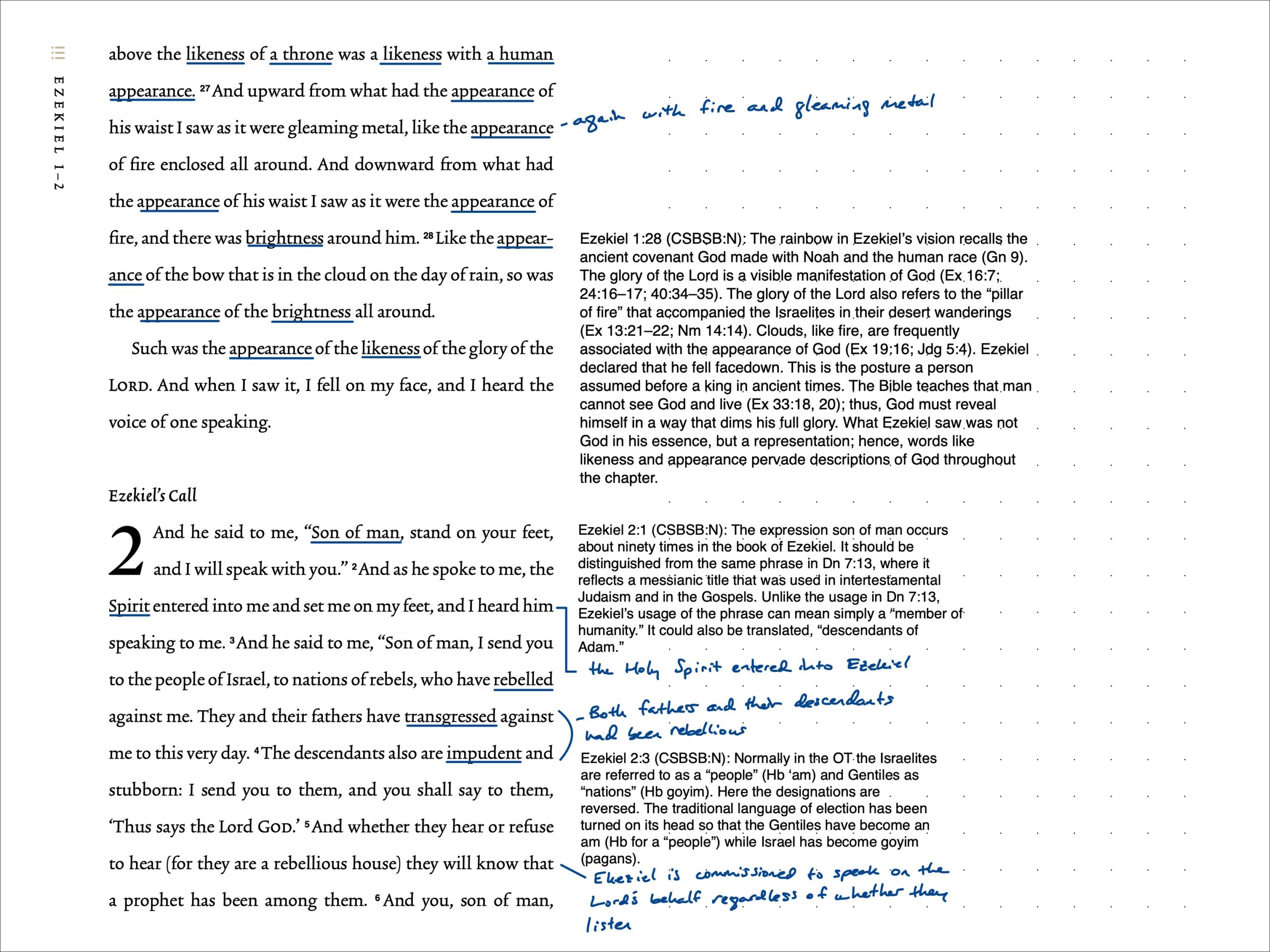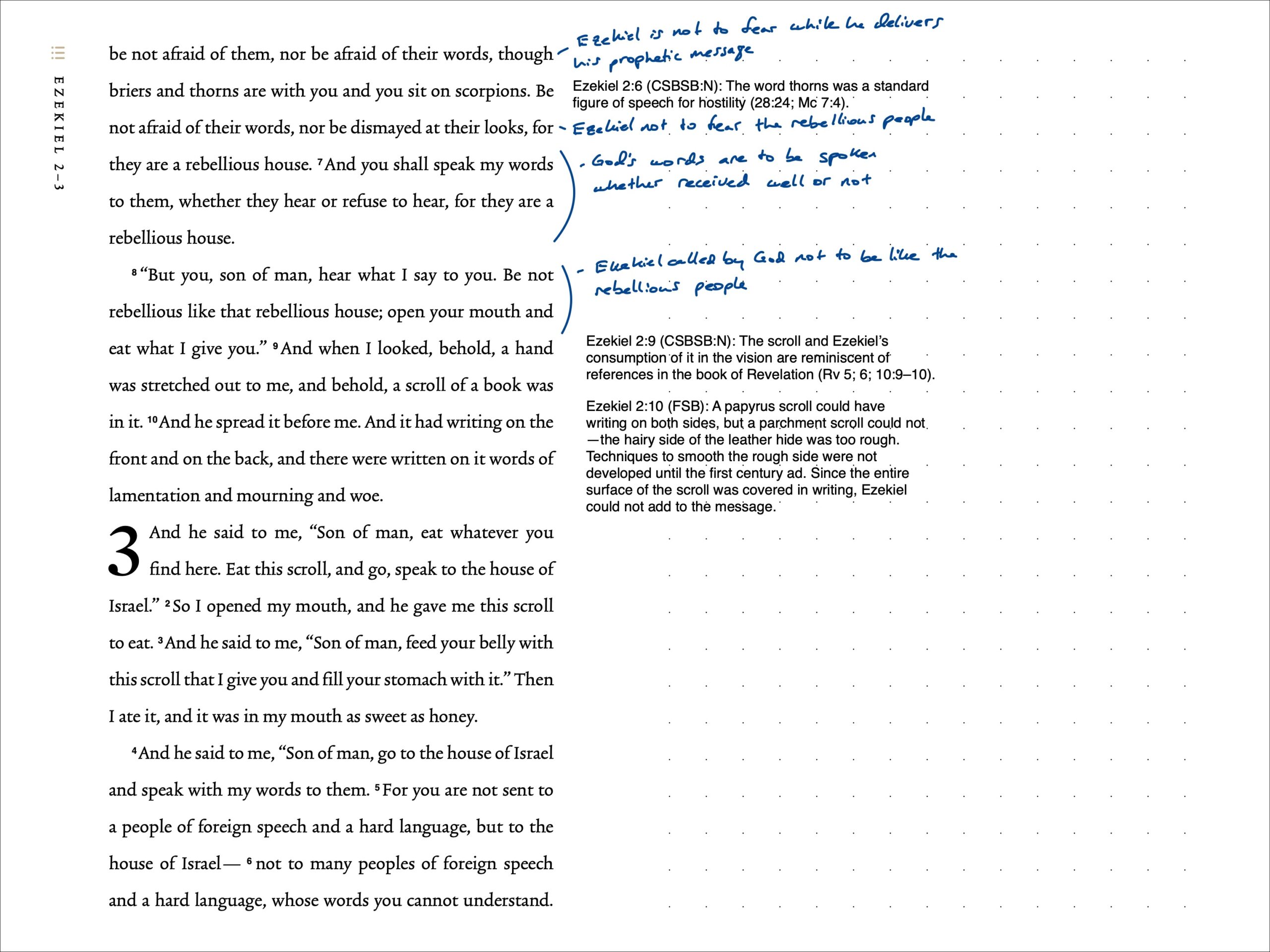| Date | Version | Reading Plan |
|---|---|---|
| @August 22, 2023 | ESV (2016) | ESV Prophets Plan 2023 |
Pericopes
- Ezekiel’s Call
Notes
The chapter opens with God speaking to Jeremiah, “Son of man, stand on your feet, and I will speak to you”. The expression “son of man” occurs about 90x in the book of Ezekiel. It should be distinguished from the same phrase in Dan. 7:13 where it reflects a messianic title. Unlike its usage in Daniel, Ezekiel’s usage can simply mean a “member of humanity”. It can also be translated, “descendants of Adam”.
In Ezek. 2:2, Ezekiel describes a physical experience with the Spirit of God who entered into him and set him on his feet. The Spirit regularly moves or picks up Ezekiel (see Ezek. 3:24; Ezek. 8:3).
In Ezek. 2:3, the Lord tells Ezekiel that He sends him to “the people of Israel, to nations of rebels, who have rebelled me.” Normally in the OT, the Israelites are referred to “people” and the Gentiles as “nations”, but the designations are reversed here. The traditional language of election has been turned on its head so that the Gentiles have become the “people” and Israel had become pagans.
In Ezek. 2:4-7, Ezekiel is commissioned by God to speak on the Lord’s behalf regardless of whether they listen. He is not to fear their words as he delivers his prophetic message (Ezek. 2:6). Ezekiel will experience briers and thorns, a standard figure of speech for hostility (Ezek. 28:24; Micah 7:4). God’s words are to be spoken whether they hear or refuse to hear (Ezek. 2:7)
The remaining verses (Ezek. 2:8-10) are of Ezekiel’s call by God not to be like the rebellious people and to eat a scroll he was given. The scroll (and Ezekiel’s consumption of it in the vision) are reminiscent of references in the book of Revelation (Rev. 5; Rev. 6; Rev. 10:9-10). The scroll is described as having “writing on the front and on the back” (Ezek. 2:10). A papyrus scroll could have writing on both sides, but a parchment scroll could not because the hairy, leather side was too rough. Since the entire surface of the scroll was covered in writing, Ezekiel could not add to the message.
Application
Ezekiel is called into his prophetic ministry and is given no flowery outlook; the people were steeped in rebellion against God, from the fathers to their descendants. God’s commission on Ezekiel’s life to convey His words to a stubborn people would be difficult, but one he was to carry out regardless of how it was received.
I cannot help but think of how this relates our calling as followers of Christ and the rejection we are sure to receive in speaking His name. In John 15:18-19, Jesus speaks that, “If the world hates you, know that it has hated me before it hated you.” In its original context, the “if” does not express any doubt; it was certain. The world hated the Lord, so it will hate all who resemble Him. But in John 15:19, we are given the reason: “because you are not of the world, but I chose you out of the world”.
We are a chosen people, a royal priesthood, set apart for glorious purpose to represent the Lord. Our position in Christ means that sin and this world no longer have any condemning power over our lives. The Spirit’s presence and power within us allows us to face the fiercest of worldly jeering and scorn, even unto death. As we confront opposition, let us be bold in our proclamation, remembering the eternal security we have as sons and daughters of the King.
Scripture Journal Notes
Commentaries & Resources Used
- ESV Study Bible. (Wheaton, IL: Crossway, 2008)
- Faithlife Study Bible (Lexham Press, 2016)
- Believer’s Bible Commentary (Thomas Nelson, 2016)
- CSB Study Bible Notes (Holman Bible Publishers, 2017)
- Matthew Henry’s Commentary on the Whole Bible (Guardian Press, 1976)
- The Bible: A Reader’s Guide (Sterling Publishing, 2011)
- The Infographic Bible (Zondervan, 2018)
- ESV Digital Scripture Journal (Crossway, 2019)

